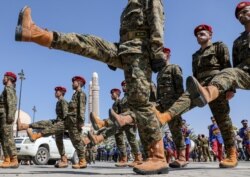The United Nations says time is running out for Yemenis, as malnutrition rates hit record highs and the war-torn country speeds towards "the worst famine the world has seen in decades."
U.N. humanitarian chief Mark Lowcock told the Security Council on Thursday that some 400,000 children under the age of 5 are severely malnourished.
"Those children are in their last weeks and months," he said. "These are the children with distended bellies, emaciated limbs and blank stares – they are starving to death."
The U.N. says 16 million Yemenis are in food crisis now, including 50,000 who are already in famine-like conditions. Another 5 million are just one step behind them.
"There is an important opportunity right now to help Yemen move towards lasting peace," Lowcock said. "Preventing famine is essential to allow that opportunity to have a chance to be realized."
New push for peace
A significant part of that opportunity is a new push to resolve the seven-year-old conflict by the U.S. administration of President Joe Biden. He has announced measures to reinvigorate the peace process, including appointing Timothy Lenderking as his special envoy for Yemen and ending U.S. support for Saudi-led coalition offensive operations in Yemen, including the halting of relevant arms sales.
At the urging of the U.N. and humanitarian organizations, the Biden administration last week also reversed a Trump administration decision to designate the Houthi rebel group as a foreign terrorist organization under U.S. law, which would have impacted commercial imports into the country and hurt humanitarian efforts. The designation was lifted on February 16.
"I want to be clear that that decision was taken because it reflects the priority we place on facilitating humanitarian assistance and the commercial import of critical commodities, such as food and fuel, in the face of this dire situation," U.S. Acting U.N. Ambassador Richard Mills told council members. "It also reflects our emphasis on revitalizing diplomacy, again, alongside the U.N. and others, to end the war itself."
He said Washington would continue to enforce existing U.N. and U.S. sanctions on certain members of the Houthi group and closely monitor their activities to consider whether additional actions are necessary.
Funding has been insufficient for humanitarian operations. In 2020, the U.N. received just under $2 billion – half of what was needed. As a result, many programs were shuttered and rations cut. Shortfalls and more cutbacks continue to hang over the operation.
On March 1, the U.N., along with Sweden and Switzerland, will co-host a pledging event for Yemen. This year, $4 billion is needed to avert widespread famine.
Battle for Marib
Meanwhile, the U.N. says it is alarmed at the escalation of fighting in the governorate of Marib in the past month. The Iranian-backed Houthi fighters, who control the nearby capital of Sanaa, have launched an offensive to capture Marib and strategic points surrounding it, including oil and gas production facilities.
"The attack on Marib must stop," the U.N. envoy for Yemen, Mark Griffiths, told the council. "It puts millions of civilians at risk."
He said the offensive is also jeopardizing the peace process.
Nearly seven years of war between the Saudi Arabian-backed government of President Abdu Rabu Mansour Hadi and the Iranian-supported Houthi rebels has pushed the Middle East's poorest country to the brink.







